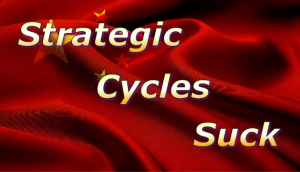A rhythmic strategy is strategy… and it isn’t
 In the Netherlands more and more shops are disappearing from our cities. Names that were once strong and established are now gone. Some have their doors still open, but only just and they struggle. Internet-shopping is pointed out as being the cause of all this misery. People in the streets are interviewed and nearly all find it a sad sight. At the same time these are the same people buying online, and so… Only a few days ago there was a news-item about yet another old name announcing yet another reorganization, another complete overhaul and another wholly new strategy. A new CEO will save the day.
In the Netherlands more and more shops are disappearing from our cities. Names that were once strong and established are now gone. Some have their doors still open, but only just and they struggle. Internet-shopping is pointed out as being the cause of all this misery. People in the streets are interviewed and nearly all find it a sad sight. At the same time these are the same people buying online, and so… Only a few days ago there was a news-item about yet another old name announcing yet another reorganization, another complete overhaul and another wholly new strategy. A new CEO will save the day.
One remark in this news item made me think. It was mentioned that this company is already losing money for at least two years… Why two years, I thought…? And what about the years before that? How sudden were the first losses two years ago? How does it happen that you start a new strategy after two years? Why not sooner?
Of course I do not know the real reason. But one hypothesis occurred to me. What if this organization is like nearly 90+% of all other organizations. What if they have a regular strategic cycle of an x-number of years, which may be sub-divided into regular update-cycles and all that. What if strategy in this organization is the well known ritual dance that 90+% of all perform. A ritual that is hard to break out of. Meaning it will take time. For example two years, and perhaps that’s quick for a situation like this.
I am relatively certain that most business people consider the x-year strategic cycle as strategy. That is not untrue. On the other hand, these cycles also look like Chinese 5 year plans. Some even like Maoist great leaps forward on a regular basis.
There is something amiss here and it brings me, again, to the thoughts of von Clausewitz. Extrapolating one of his most quoted remarks can bring you to requiring a business strategy when your organization needs to make money by other means. The term “other” in this may mean totally, or even radically, different. Something has changed to the extent that the situation in which your organization finds itself is so different than it was before. As different as the move from peace to war, with these latter two both being political situations as pointed out by von Clausewitz. There is a burning platform approaching, perhaps already nearby, and you’d better consider it now, and not wait until the rhythm of your strategic cycle tells you to.
Unlike politics with its war and peace, in business we are in business and in business. When our organization is out of business, it is out of business. End of story! So the analogy seems to falter. But not so. I propose to distinguish two states of business: business as usual and business in motion.
Business as usual may feel as boring stuff. But make no mistake. I think that like peace this is the preferred situation; steady as she goes, doing your business, earning your money, making your customers happy, your staff, your shareholders and all that. You need to keep your bearing and so a regular cycle is what you want. You need to keep an eye on the situation. But when the signs of change are on the horizon, like the signs of war in politics, you need to drop regularity. You need to get going on your strategy. You need to get things into motion. Your next strategy starts now.
Jan-Willem Boots is co-founder of Changing Games



